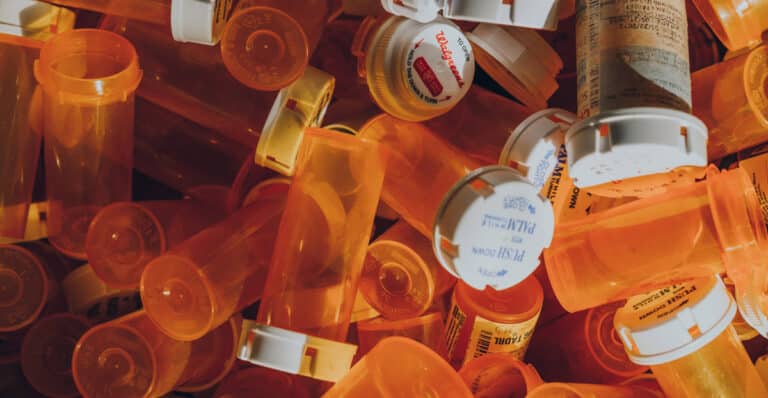AI can now predict designer drugs before they even hit the market

Earlier this year, the European Union Agency for Criminal Justice Cooperation (Eurojust) released a report addressing the stark rise in the production of ‘synthetic drugs’ that poses legal challenges for prosecutors across Europe. Citing 562 cross-border drug trafficking cases handled by the agency alone, the report highlighted how synthetic and other designer drugs make up for almost one-third of the number. “This phenomenon has increased due to the COVID-19 pandemic, with organised crime groups (OCGs) adapting quickly to an online environment using secured communication channels, crypto-phones, cryptocurrencies and darknet markets,” the report continued.
In short, synthetic drugs are flooding the market even before governments can identify and outlaw them. With fatal overdoses from illicit tranquilisers jumping six-fold in the US over the pandemic, law enforcements around the world are presently on a quest to stay ahead of the curve and anticipate these drugs before they even hit the market. How? Enter AI in all of its harnessable glory, here to give cops a heads-up that could help shrink month-long drug investigations down to days.
Before we embark on the innovative road to faster and better drug discovery, however, let’s break down the concept of synthetic and designer drugs. Remember the time when people across the US were overdosing on bath salts in their hot tubs? Designer drugs refer to substances like bath salts and synthetic marijuana that are engineered in a laboratory to recreate the effects of traditional illicit drugs such as amphetamines, ecstasy, lysergic acid diethylamide (LSD), ketamine and more. Basically, if you peek behind the scenes of such drugs, you would see a bunch of underground chemists playing around with new molecules that emulate the psychoactive effects of conventional drugs.
This particular factor is what makes the substance practically undetectable by law authorities. “Because their chemical structures are different from the drugs they are intended to mimic, designer drugs frequently escape regulation, making them easier to obtain by users,” noted DrugAbuse.com, adding how they are often undetectable by screening tests at the same time. This not only fosters the concept of a ‘legal high’—where manufacturers technically can’t be prosecuted—but also opens up various possibilities for new synthetic drugs, presently limited only by our imagination.
Now, researchers at the University of British Columbia (UBC) are dedicated to tackling the issue head-on—with a little help from the space-age technology we currently call AI. In a study published in the online journal Nature Machine Intelligence, Doctor Michael Skinnider and his colleagues fed an AI model with a database of known psychoactive substances contributed by forensic laboratories around the world. With the aim of training the model on the structures of the drugs, the algorithm used was inspired by the structure and function of the human brain. Based on this training, the model then learned to predict 8.9 million potential designer drugs that could be developed and eventually hit the market.
Researchers then tested the AI against 196 new designer drugs that had emerged on the illicit market—while the model was being trained. We’re talking about drugs that the AI didn’t even know existed at the time. The result? The model had already predicted the emergence of more than 90 per cent of those drugs.
“The fact that we can predict what designer drugs are likely to emerge on the market before they actually appear is a bit like the 2002 sci-fi movie, Minority Report, where foreknowledge about criminal activities about to take place helped significantly reduce crime in a future world,” said senior author Doctor David Wishart, a professor of computing science at the University of Alberta. In a press release, he mentioned that the software essentially gives law enforcement agencies and public health programmes a head start on the “clandestine chemists” and lets them know what to be on the lookout for.
Now, one question remains. Is the model capable of identifying completely unknown substances from scratch, rather than predicting from a set of data? According to the researchers, the AI has also learned to predict the sort of molecules that are more likely to appear on the market. “We wondered whether we could use this probability to determine what an unknown drug is—based solely on its mass—which is easy for a chemist to measure for any pill or powder using mass spectrometry,” said Doctor Leonard Foster in the press release.
The researchers, hence, tested this hypothesis by leveraging the dataset of the 196 new synthetic drugs. Using only the mass, the model was able to list the chemical structures that landed in the top 10 most popular drugs with 72 per cent accuracy. Little tweaks and bits of chemical data further boosted this accuracy to 86 per cent. When it came to just one guess, the model could predict the correct structure 51 per cent of the time.
According to Doctor Skinnider, similar models could soon be used to discover all kinds of new molecules—from identifying new performance-enhancing drugs for athletic doping to previously unknown molecules in human blood and urine. “There is an entire world of chemical ‘dark matter’ just beyond our fingertips right now,” he concluded. “I think there is a huge opportunity for the right AI tools to shine a light on this unknown chemical world.”
With some authorities already expressing their interests in adopting and using the model as part of their investigation, one fact is out in the open: AI undoubtedly has the higher ground than governments across the world when it comes to keeping up with new drugs on the market. And the role of technology in drug discovery might just be starting to live up to its hype.





